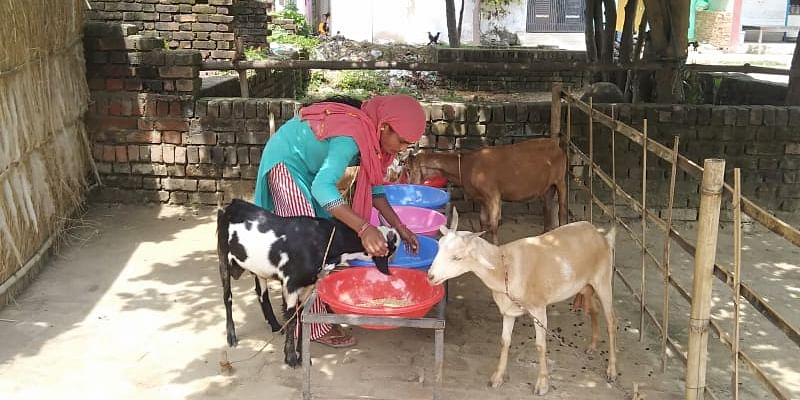Munni Devi quotes a price and the butcher reluctantly agrees. He’s slowly getting used to being asked to pay a certain amount for the goats by the women of the village, 30 kms from Lucknow. It wasn’t always like this for Munni Devi and her friends. Coming from an arid region with very little decision-making power, her new role as a goat trader who influences buying and selling decisions, speaks volumes about women’s empowerment in a small hamlet.
Rural women stand at an enormous disadvantage, given their limited access to education, healthcare, security and the lack of agency to make decisions without a male family member’s intervention. Poverty has only aggravated their miseries. When Covid struck, the lockdowns and curfews pushed daily-wage earners into unemployment. With deeper poverty came a sharp rise in domestic violence all over India.
Another major socio-economic problem is the unwillingness to let go of cultural traditions and practices that are regressive and impede development. Illiteracy, lack of technical know-how, and the inability to incorporate technology or science into everyday work have led to decreased efficiency and productivity. Communities in rural settlements have limited access to banks. This makes it even more difficult to start a business or expand a venture.
Why do farmers depend on allied activities?
The 535 million livestock population, largely owned by marginal farmers, is a major source of cash income. Although the trade in livestock products has seen some efficient business processes, live livestock trade has remained largely informal and inefficient. Formal market processes have never included small ruminants like sheep and goats. So, technological solutions have not aided these processes. And this has adversely affected not only trade but thousands of livelihoods.
The dependence on livestock stems from lack of arable land and availability of water. Animal products are not only a source of food but also a source of income for many small farmers. Selling three goats is equivalent to 1 acre of traditional farming. The income from trading in livestock can be used to purchase agricultural inputs such as seeds, fertilizers, and pesticides. Simply put, this additional income can be used to put food on the table, when farming doesn’t reap the benefits.
Challenges of trading in ruminants
The global food and agricultural system is volatile. The growing importance of brands, increase in the number of supermarkets, health issues faced by rural communities, and the deterioration of the natural resource base, have influenced the way allied activities are currently undertaken.
Some of the challenges that farmers face while trading in small livestock are:
- Low productivity
- Shortage of fodder and feed
- Unorganized/ absence of a transparent pricing system
- Inadequate infrastructure for marketing
- Risk of contagious diseases
- Knowledge gap
The spread of diseases and the extremely high indirect costs incurred while trading through the traditional livestock trading system are major drawbacks for farmers.
As per a National Sample Survey Organization (NSSO) survey conducted in 2003, only 5.1% of farmer households in India were able to access information on animal husbandry as against 40.4% on crop farming.
There is an urgent need for extension services like animal breeding, healthcare, feed and fodder production, marketing, etc. One major sector that empowers farmers with the right skills and knowledge is the Livestock Extension Service. Though goat farming in Uttar Pradesh is considered lucrative, marginal farmers and livestock owners who sell goats make very little money as opposed to butchers and wholesale meat buyers.
PashuBajaar
A marketplace for goat-based livelihoods.
When women livestock owners bring their goats, the goats are weighed and then a Pashu Sakhi (friend of livestock) declares a live body weight price. The owners have the choice to sell the goat to the Pashu Sakhi or other buyers, depending on the price.
This system of objective pricing, based on prevailing meat market prices, gives the livestock owners greater bargaining power. Other factors influencing pricing include meat-bone ratio and productivity indicators (in the case of female goats).
When everything has a price, why can’t the goat too?
Sanjeev Kumar’s brainchild, PashuBajaar, a for-profit social enterprise, was formed in 2014, but it took 2 to 3 years to kick off. He had to develop a unique model that would help in the trading of goats. Alongside, he also had to gain the trust of the villagers to conduct business with them.
Social Alpha, a multi-stage innovation curation and venture development platform that helped PashuBajaar with overall strategy, finance, business opportunity mapping and development of their tech-based interventions, believes in “the vision to create a robust market access mechanism where small, marginal or landless farmers have an option to generate livelihoods for themselves without having to compromise on their earning potential or take on a risk beyond their means.”
Small livestock are largely women’s assets due to socio-economic factors. Exposure for women in rural areas is quite low and it is likely that they would be unaware of market prices. The trade of live livestock came under the hammer during the pandemic as most of the mandies were shut and there were no alternative trade channels. A gender focussed marketing strategy, marked by transparency and efficiency, led to the formation of PashuBajaar.
By training a Pashu Sakhi, setting up small livestock trading centres in every village, training women as livestock price assessors and building supply chains to ensure goats purchased by women get sold from the village level centre, Sanjeev has been empowering women. The goat now has a fixed price and this enables families to sell it to butchers, wholesalers and retailers.
PashuBajaar also certifies highly productive goats, thus adding value to the livestock. A trained livestock price assessor is appointed as a business counsellor at the village and cluster levels. Goats are procured through women trained at the village level and then brought to a cluster-level Livestock Trade Center where they’re provided preventative healthcare services along with a 21-day incubation under the guidance of a trained veterinarian.
PashuBajaar has helped landless farmers achieve:
- Higher frequency of income
- Lower mortality rate and better ROI
- Improved breed management that leads to optimal use of resources like water and feed
How does goat rearing lead to fodder cultivation?
Cultivation of fodder/ grass on barren lands requires little effort and maintenance. The topsoil, which had earlier been rendered useless due to inactivity, is slowly brought back to life with these low intensity fodder growing activities. Once the land is cultivated, the SOC (soil organic compound) levels begin to increase which can then help in growing high intensity crops on the same soil. This results in tillable soil structures, leading to better carbon sequestration in the region and higher precipitation.
Employing tech for game-changing operations
The first for-profit social enterprise to leverage tech in livestock trade, that too on such a large scale, PashuBajaar has been solving problems using technology and developing efficient supply chains in partnership with livestock farmers since 2014. Accessing technology in areas where even basic internet is inaccessible — using smartphones to give buyers and sellers updates and notifications — is a herculean task, says Sanjeev. In rural areas, the mobile phones that women have access to are often used by their husbands or sons. So reaching out to them for timely updates can be extremely difficult.
Sanjeev adds, “To use tech efficiently, internet connectivity, mobile phones and training in tech are imperative. And for this funds are crucial.”
Technology is critical to formalising and making systems efficient. But, it needs to be implemented in a phased manner, keeping the people at the grassroot level in mind.
Technology has provided:
- Better control and tracking at scale
- Cost controls without losing out on quality
- Communities with reach and visibility
Experts who can help with the architecture and design of apps and technological ideas that push conventional boundaries, are important to sustain organisations like PashuBajaar.
What does the future look like for Pashu Sakhis?
Uttar Pradesh is the third largest goat meat producer in the country. The 2019 statistics show that UP has 14.48 million goats, with the Lucknow market selling about 12,000 kg of goat meat every day. With such a huge market, the quality of meat needs to be carefully ascertained. The chance of consumers buying old goats or bad quality goat meat is very high. Buyers don’t know where the meat is from, nor are they aware of the issues related to buying bad goat meat. Keeping all these in mind and the fact that meat retailing isn’t an organised sector, PashuBajaar recently launched ‘Roumash’, a quality goat meat home delivery service in Lucknow. They are also in talks with Swiggy to provide good quality goat meat on a larger scale.
In 2021, PashuBajaar won 4 major awards:
- Water & Energy for South Asia (WE4Asia) grand challenge of USD 200000
- Krishi Mangal (Supported by CISCO CSR)
- India Agritech Incubation Network (Supported by BMGF)
- Ashoka Innovators for public
Over the next 4 years, Sanjeev’s vision for PashuBajaar is to build an online platform — a one-stop solution for all livestock business needs from Breed to Bajaar. Training, finance, inputs and sales facility, all of these will be integrated into a robust platform that will act as a front-end market for companies and farmer organizations. Its working model will be replicated in partnership with local entrepreneurs across cities and towns in various states to link 1 million livestock farmers with a remunerative assured marketplace.
“We have plans to cover all major livestock like cows/buffaloes and pet animals in due course. Our major challenge has been developing a robust technology platform, which caters to the needs of women farmers in remote regions. As internet connectivity is still a challenge, we dream of building an automated process to reduce costs and assure services promptly,” says Sanjeev.
PashuBajaar has made financial independence possible for over 10,000 women goat farmers in the most poverty-ridden pockets of Uttar Pradesh with technological interventions.










